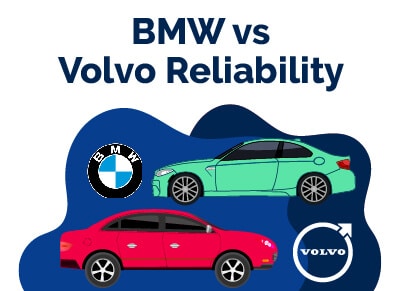BMW vs. Volvo Reliability (Fully Compared)
March 23, 2023


Chris is Head of Content for FindTheBestCarPrice and is based out of Philadelphia, PA. As a seasoned automotive industry analyst and car enthusiast, he ensures the highest level of quality across all our content and curates our picks for the best deals each month.
Chris studied information systems and marketing at Drexel University and writes about a wide range of topics ranging from car buying tips to troubleshooting common mechanical issues.
When he’s not thinking about cars, he likes to stay in with his dog and make an “attempt” to finish a crossword puzzle (he’s not quite at the Saturday/Sunday level…yet). As a former cheesemonger, Chris still has a “sharp” passion for all things cheese, and his fridge is always loaded with it!
Chris also has a passion for things that go fast, and drones are no exception. He spends some of his time writing for Dronesourced.
When selecting a new car, reliability is essential. The last thing any driver wants is to be frequently sidelined by repairs, especially with brands known for their quality.
When it comes to dependability and safety, Volvo has long stood out, embodying the high standards that many car buyers seek. BMW, while also highly regarded, often finds itself just a step behind Volvo in the reliability race.
Volvo distinguishes itself with superior safety features, consistently high-reliability scores, and efficient gas mileage, making it an excellent choice for those prioritizing longevity and cost-effectiveness.
BMW, on the other hand, shines in the performance department, offering an unmatched driving experience for enthusiasts.
Leveraging our automotive expertise, this post will delve into a head-to-head comparison of BMW and Volvo's reliability. Our goal is to arm you with the knowledge needed to choose the brand that best fits your lifestyle and driving needs.
Let's get started.
Table of Contents
BMW vs. Volvo Reliability: A Detailed Comparison
| Features | BMW | Volvo |
| Engine and Performance | ||
| Gas Mileage | ||
| Safety | ||
| Technology | ||
| Repair and Maintenance Cost | ||
| Durability | ||
| Design |
BMW vs. Volvo Reliability: Which Is Better?
BMW has struggled with reliability in the past, but this struggle wasn't in vain since BMW's reliability improved over the years. However, BMW got a few miles to cover to beat Volvo's reliability.
According to Consumer Reports, BMW was among the Top 3 most reliable brands. In the 2022 Consumer Reports reliability survey, BMW ranked 3rd with 65 points, a vast improvement compared to Volvo's 14th ranking with 45 points.
While BMW has had issues with reliability in the past, the brand has made efforts to improve in recent years. For example, BMW has implemented a program called "BMW 360°," which aims to improve the reliability of its vehicles.
The program includes measures such as increased testing and enhanced quality control. As a result, BMW's reliability scores have improved in recent years, but the brand still has a long way to go to catch up to some of its competitors.
While BMW beats Volvo in the JD Power 2022 Dependability Survey, Volvo has a higher reliability rating than BMW on RepairPal. You get a 3.5/5.0 reliability rating from Volvo, ranking 17th out of 32 car brands. BMW, however, only ranked 30th with a 2.5 reliability rating.
Because the ratings are unstable for both brands, we must compare their respective features.
Volvo offers better safety features, gas mileage, and cheaper repair and maintenance costs. BMW is a better option for performance and engine power.
BMW vs. Volvo Reliability: Durability
There's no denying that Volvo cars are built like rocks and are more durable than BMWs. You'll still find some old Volvos on the road today.
The Volvo brand adopts a rugged design philosophy, implementing measures that involve using high-quality materials and increasing testing during the design and development process. This in turn improves the reliability of its vehicles.
On the other hand, BMWs adopt a lighter frame, enhancing the cars' speed, aerodynamics, drag, and overall performance. While both brands have different audiences that their designs appeal to, the guarantee for safety is not equal for both brands.
Volvo's design philosophy borders on producing safer and more practical cars, which makes it a more durable option. BMW is more interested in the sheer pleasure of driving, producing luxury sports and high-performance vehicles.
Winner: Volvo
BMW vs. Volvo Reliability: Repair and Maintenance Cost
It is a clear win for Volvo when it comes to repair and maintenance costs. According to RepairPal, Volvo has an average annual repair and maintenance cost of $769, while BMW gets a costlier of $968 average repair and maintenance cost.
You get a 15% chance of major repairs on a BMW, with a 0.9 probability of visiting the repair shop. This is compared to Volvo, which only got a 0.5 chance and a 9% probability of major repairs.
Volvo's lower repair and maintenance cost stems from its impressive standard of durability. BMWs are cool cars, but not as strong as Volvos. Their cars are not built as Volvo vehicles to withstand intense wear and tear.
This does not imply that BMW vehicles are not durable, just that they are not on the same level as Volvos. In the bid to achieve great speed and performance, BMW's lightweight frame isn't as reliable as Volvo's.
This is also because BMWs are luxury vehicles, so they always come with a higher price tag.
Winner: Volvo
BMW vs. Volvo Reliability: Safety and Technology
Volvo is safer than BMW. If we are to define the Volvo brand with just one word, it's going to be 'Safety.'
Volvos uphold extremely high standards of safety that they do not just beat BMW at it, but their records are used as an international standard for other brands. The evolution of Volvo's safety systems which started as early as 1944 has grown to an almost unbeatable level.
Volvo is the safest car in the world and it's going to be hard to beat them in that position. All 13 cars that Volvo produced in 2022 earned the IIHS Top Safety Pick (+) award. This is compared to BMW, which only has five vehicles that made it to that spot.
One of the reasons for Volvo's strong reliability record is the brand's focus on safety. They have a long history of prioritizing safety in their vehicles. This is seen in the use of high-strength materials, integrations of high-grade technologies, and implementation of advanced driver assistance systems.
This shouldn't surprise you as Volvo's Vision statement clearly states, "Nobody should die or be seriously injured in a Volvo." Because Volvo is set to maintain its vision of no death in Volvo vehicles, does it mean nobody has and will ever die in a Volvo car?
Honestly, accidents can happen, and you must understand that you are fully responsible for your safety. Overall, you can rely more on Volvo's safety systems than BMW’s.
Winner: Volvo
BMW vs. Volvo Reliability: Engine and Performance
BMW doesn't lose in all categories. They are better than Volvo when it comes to engines and performance. The reputation of the BMW brand stands on its production of a wide range of powerful engines, which deliver incredible speeds at quick accelerations.
The availability of high-performance engines with large displacement and unbelievable horsepower ratings are factors that BMW beats Volvo to. You should compare several BMW and Volvo models to reach a clear conclusion.
However, even if you do, BMW has more 'super engines' than Volvo. For instance, look at the new BMW 2023 M5, which features a 4.4-liter V8 engine that produces 600hp and 553 lb-ft torque.
Volvo tries to meet up to the competition with the Polestar 1, but BMW is more conversant with the game.
BMW's superb engine performance goes beyond speed and power. You get amazing driving dynamics, advanced suspension systems, and agile handling. You shouldn't expect less from a car built to help you experience the joy of driving.
Winner: BMW
BMW vs. Volvo Reliability: Gas Mileage
It's a mixed game when it comes to comparing the gas mileage of BMW and Volvo. This is because both car brands offer a range of models with varying gas mileage.
Whatever choice you make, don't forget that the electric versions of both brands provide better gas mileage.
You can consider the Volvo S60 T8 plug-in hybrid or BMW 330e. Comparing popular gasoline options from both brands, the 2023 Volvo S90 returns 23/31 MPG city and highway, respectively, while the 2023 BMW 5 series returns 25/33 MPG.
While BMW performs better here, the Volvo S60 beats the BMW 3 series with better gas mileage.
To ensure that you make informed decisions, you'll need to test drive any of the cats you wish to buy from each brand, research its specs and features, and hopefully go with a mechanic or industry expert.
Winner: Both
BMW vs. Volvo Reliability: Design
When it comes to comparing the design of car brands, the final decision usually boils down to individual preferences. This is because both brands have different and unique design philosophies.
BMW tilts towards a sleek, sporty, and performance-oriented design. With a BMW car, you are assured of speed, agility, handling, dynamism, and aesthetics.
On the other hand, Volvo adopts a practical design, ultimately producing safer cars.
Volvo adopts a more Boxy and utilitarian design, a more robust and rugged appearance.
Both car brands deliver the highest quality, but while BMW achieves performance, Volvo gets more safety. It all depends on what you need in a car.
Winner: Both
Conclusion
Volvo is more reliable than BMW. Instead of making general conclusions on the reliability, it's essential that you consider the individual strengths and weaknesses of both brands, according to the models that you wish to buy.
This will help you make the right choice depending on your individual needs and priorities.
Best Car Deals by Category
Posted in Car Buying Tips, Car Troubleshooting |




